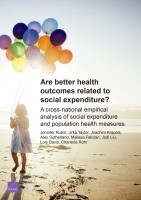| 来源类型 | Research Reports
|
| 规范类型 | 报告
|
| DOI | https://doi.org/10.7249/RR1252
|
| 来源ID | RR-1252-RC
|
| Are better health outcomes related to social expenditure? A cross-national empirical analysis of social expenditure and population health measures |
| Jennifer Rubin; Jirka Taylor; Joachim Krapels; Alex Sutherland; Melissa Felician; Jodi L. Liu; Lois M. Davis; Charlene Rohr
|
| 发表日期 | 2016
|
| 出版年 | 2016
|
| 页码 | 123
|
| 语种 | 英语
|
| 结论 |
- Countries with greater social expenditure have better health outcomes, even when this is tested in many different ways.
- Public social expenditure by governments seems to have a particularly strong relationship with health outcomes.
- Some areas of social expenditure, such as old-age spending, appear more strongly positively related to better health outcomes than others. In addition, the strength (and at times direction) of the relationship with better health outcomes varies depending on the area of social expenditure (e.g. unemployment, family programmes etc.).
- Better health outcomes seem to be even more evident when time lags between health outcomes and when the social expenditure occurs are incorporated in the analysis -- perhaps because social expenditure can take time to translate into better health outcomes. We tested time lags of various lengths and found that the associations get somewhat stronger with lags greater than seven years.
- Countries with higher levels of trust in others tend to have both higher levels of social spending and better health outcomes.
- Higher inequality is associated with an even stronger association between social spending and health outcomes. In other words, social protection may be more important for health outcomes in more unequal societies.
- There is also a strong positive relationship between social expenditure and health outcomes across US states. As with our cross-national analysis, the associations differed depending on the type of expenditure, with the strongest results for unemployment and income maintenance payments.
|
| 摘要 |
- As next steps, we suggest broadening of the analysis to include further contextual factors that may affect the relationship between social spending and health outcomes.
- In addition, we suggest deepening of the analysis to explore the pathways and mechanisms from social spending to health outcomes and the role of social programme's design and implementation.
|
| 主题 | European Union
; Health Disparities
; Public Health
; Social Determinants of Health
; Social Services and Welfare
; United States
|
| URL | https://www.rand.org/pubs/research_reports/RR1252.html
|
| 来源智库 | RAND Corporation (United States)
|
| 引用统计 |
|
| 资源类型 | 智库出版物
|
| 条目标识符 | http://119.78.100.153/handle/2XGU8XDN/108412
|
推荐引用方式
GB/T 7714 |
Jennifer Rubin,Jirka Taylor,Joachim Krapels,et al. Are better health outcomes related to social expenditure? A cross-national empirical analysis of social expenditure and population health measures. 2016.
|
|
文件名:
|
x1535045556295.jpg
|
|
格式:
|
JPEG
|

|
文件名:
|
RAND_RR1252.pdf
|
|
格式:
|
Adobe PDF
|
除非特别说明,本系统中所有内容都受版权保护,并保留所有权利。